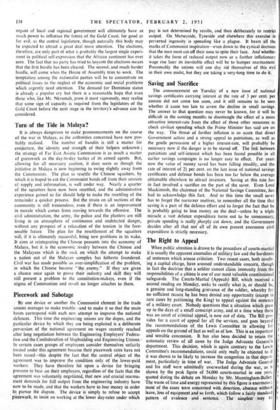Turn\ of the Tide in Malaya?
It is always dangerous to make pronouncements on the course of the war in Malaya, as the authorities concerned have now pro- bably realised. The number of bandits is still a matter for conjecture, the identity and strength of their helpers unknown ; the strategy of Far East Asiatic Communism is as much a matter of guesswork as the day-to-day tactics of its armed agents. But, allowing for. all necessary caution, it does seem as though the initiative in Malaya is now beginning to swing slightly away from the Communists. The plan to resettle the Chinese squatters, by which it is hoped to cut the Communist bands off from their sources of supply and information, is well under way. Nearly a quarter of the squatters have now been resettled, and the administrative experience gained so far should help to make the resettling of the remainder a quicker process. But the strain on all sections of the community is still tremendous, even if there is an improvement in morale which comes from moving towards the offensive. The civil administration, the army, the police and the planters are still living in an atmosphere of continuous and undetected danger, without any prospect of a relaxation of the tension in the fore- seeable future. The plan for the resettlement of the squatters will, if it is ultimately successful, bring new problems in its wake. It aims at reintegrating the Chinese peasants into the economy of Malaya, but it is the economic rivalry between the Chinese and the Malayans which is the rock on which the attempt to make a nation out of the Malayan complex has hitherto foundered. Civil war has made possible an over-simplification of the problem, in which the Chinese become " the enemy." If they are given a chance once again to prove their industry and skill they will still present a problem to the constitution-makers, even if the stigma of Communism and revolt no longer attaches to them.


































 Previous page
Previous page